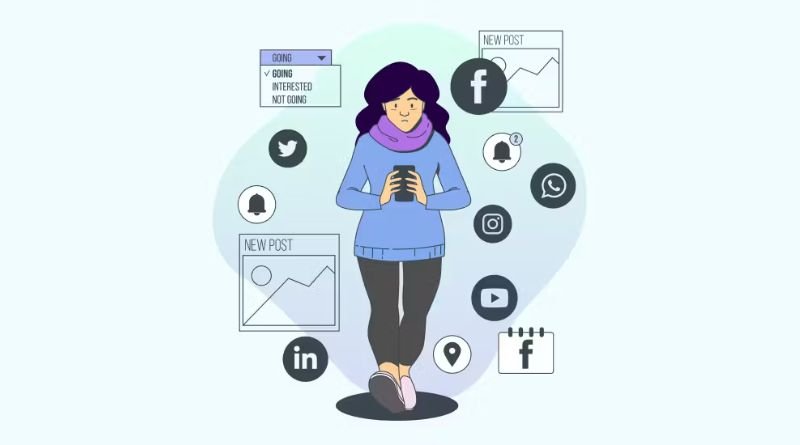Social media has become an integral part of modern life, connecting billions of people across the globe. Platforms like Facebook, Instagram, Twitter, and TikTok have transformed the way we communicate, share information, and interact with others. While social media offers numerous benefits, it also presents significant risks, particularly concerning mental health. Understanding both the positive and negative impacts of social media on mental health is crucial as we navigate this digital age.
The Benefits of Social Media on Mental Health
Social media can have a positive impact on mental health in various ways:
- Connection and Community: Social media enables people to connect with friends, family, and like-minded individuals, regardless of geographic distance. This can be especially beneficial for those who feel isolated or are part of niche communities. Online support groups and communities can provide emotional support, share resources, and foster a sense of belonging.
- Access to Information and Resources: Social media platforms are rich sources of information on mental health. Users can find educational content, self-help resources, and information on mental health services. This accessibility can empower individuals to seek help and make informed decisions about their mental health.
- Raising Awareness: Social media has played a crucial role in raising awareness about mental health issues. Campaigns like #BellLetsTalk and #MentalHealthAwareness have sparked global conversations, reducing stigma and encouraging people to speak openly about their struggles.
- Creative Expression: Platforms like Instagram, TikTok, and Pinterest allow users to express themselves creatively through photos, videos, and art. Creative expression can be a therapeutic outlet for emotions and a way to connect with others who share similar interests.
- Peer Support: Social media facilitates peer-to-peer support, where individuals can share their experiences and offer advice to others facing similar challenges. This peer support can be particularly valuable for those who may not have access to traditional mental health services.
The Risks of Social Media on Mental Health
Despite its benefits, social media also poses significant risks to mental health:
- Cyberbullying and Harassment: Social media platforms can be breeding grounds for cyberbullying and harassment. Negative comments, online shaming, and targeted attacks can have devastating effects on an individual’s self-esteem and mental well-being, leading to anxiety, depression, and even suicidal thoughts.
- Social Comparison: The constant exposure to curated, idealized images of others’ lives can lead to unhealthy social comparison. Seeing others’ achievements, beauty, and lifestyles can foster feelings of inadequacy, low self-esteem, and dissatisfaction with one’s own life.
- Fear of Missing Out (FOMO): Social media amplifies the fear of missing out, as users are bombarded with images and updates of others engaging in exciting activities. This can lead to feelings of loneliness, anxiety, and a compulsive need to stay connected, even at the expense of one’s well-being.
- Addiction and Overuse: The addictive nature of social media can lead to excessive use, which can negatively impact mental health. Spending too much time online can result in reduced face-to-face interactions, disrupted sleep patterns, and a decrease in overall life satisfaction.
- Misinformation and Mental Health: Social media is rife with misinformation, including false or misleading information about mental health. This can lead to harmful self-diagnosis, inappropriate treatments, and increased anxiety or paranoia.
Balancing the Benefits and Risks
To maximize the benefits of social media while minimizing the risks, it’s important to use these platforms mindfully:
- Set Boundaries: Establish time limits for social media use to prevent overuse and ensure that it doesn’t interfere with daily life. Taking regular breaks from social media can also help reduce feelings of anxiety and FOMO.
- Curate Your Feed: Be selective about the content and people you follow. Surround yourself with positive influences, and unfollow accounts that trigger negative emotions or unhealthy comparisons.
- Engage in Meaningful Interactions: Focus on quality over quantity in your social media interactions. Engage in conversations that are supportive, constructive, and uplifting rather than superficial or negative.
- Seek Help When Needed: If social media use is negatively impacting your mental health, consider seeking professional help. Therapists can offer guidance on how to manage social media use and address any underlying issues.
Conclusion
Social media is a powerful tool that can both positively and negatively impact mental health. While it offers opportunities for connection, support, and creative expression, it also poses risks such as cyberbullying, social comparison, and addiction. By using social media mindfully and setting boundaries, individuals can harness its benefits while protecting their mental well-being.
FAQs
1. How does social media affect mental health?
Social media can impact mental health both positively and negatively. It can offer support, information, and a sense of community, but it can also lead to issues like cyberbullying, social comparison, and addiction.
2. What are the signs of social media addiction?
Signs of social media addiction include spending excessive time online, feeling anxious or stressed when not using social media, neglecting face-to-face interactions, and having difficulty limiting social media use.
3. How can I protect my mental health while using social media?
To protect your mental health, set time limits for social media use, curate your feed to include positive influences, engage in meaningful interactions, and take breaks when needed.
4. Can social media be beneficial for mental health?
Yes, social media can be beneficial by providing access to support groups, mental health resources, and creative outlets. It can also help raise awareness about mental health issues and reduce stigma.
5. What should I do if social media is negatively affecting my mental health?
If social media is negatively affecting your mental health, consider taking a break, unfollowing negative accounts, or seeking professional help from a therapist or counselor.
